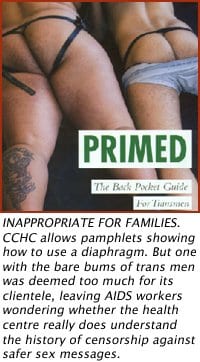Officials at the Centretown Community Health Centre have deemed a new safer-sex brochure to be too racy for public display.
The brochure, which is aimed at queer trans men, is called Primed: The Back Pocket Guide For Transmen & The Men Who Dig Them. It will not be displayed in the public areas of the health centre, says Cathy Collett, a program manager.
“When we received the pamphlet, we reviewed the content,” says Collett, “and certainly the information is very important information, but we felt that as a result of the explicit nature of the photos, we made a decision that we would not put it in the public display, but that we would make it available through our service providers and in particular our counsellors.”
Collett added that people who want the brochure can ask at the front desk of the centre, and copies will be made available.
However, when asked, both the receptionist at the centre’s main desk, as well as the staff member at the medical reception desk had never heard of the guide, and one staff member said that the centre did not carry it.
Collett conceded that follow-up work may need to be done so that all staff would be made aware of the guide in the case that they are asked for it.
Produced by the Gay/Bi/Queer Transmen Working Group, which is a part of the Ontario Gay Men’s HIV Prevention Strategy, the guide’s front cover features a photograph of two nude bodies lying face-down, side-by-side, shown from the waist down. Images inside the brochure depict real people in various scenarios, some of which include nude buttocks, as well as people depicted fully clothed and kissing, and posing with dildos. The information offered in the guide ranges from a discussion on ‘passing’, how to have safer sex, how to cruise safely, and even how to care for sex toys, as well as info about sexually transmitted infections. In the tradition of safer-sex information, the tone of the pamphlet is deliberately frank and accessible.
According to the pamphlet, which is also available on the group’s website, www.queertransmen.org, “there is limited information available for trans people around sexual health and many misconceptions in various communities, including trans, LGBTQ and mainstream.”
The group also writes that “this resource is an effort to combat this, to bring together important information and make it available to transmen so that we know what risks we are taking, what choices we have, what questions we should ask and to remind ourselves that our health and bodies matter.”
The guide can be read in its entirety on the website, and also downloaded free of charge, which is especially notable given that members of an already-marginalized community could feel daunted by asking a stranger at the health centre for a copy.
AIDS activists are disappointed that a health centre would censor important safe-sex information by hiding it behind a counter.
“I don’t know why [the Centretown Community Health Centre] wouldn’t have the pamphlet available. We have our copies in our front display case,” says Michelle Ball, education and health promotion coordinator at the AIDS Committee Of Ottawa.
Ball is unimpressed with CCHC’s claims that the imagery is too explicit. “It’s two bums [on the cover]. One hundred percent of the population has a bum.”
Ball also said that she worries about what sort of messages are being sent when access to important sexual health information, such as that contained in ‘Primed,’ is made complicated.
“As a society we chose to make certain communities invisible, and the trans community is one of those communities,” says Ball. “We even [have to] consider human rights, that invisibility is there if we talk about medical and health care services. The least we can do is put out resources. The least we can do, in this climate and as service providers, is try to create an environment where at least the imagery supports the community that we live in, and the community that we live in includes transgendered people and transsexuals. That would be my concern about not having this booklet readily available.”
Collett is unable to explain why other pamphlets depicting anatomically correct images of penises and vaginas, such as those depicting proper use of condoms and diaphragms, are displayed in public areas, while ‘Primed’ has been banned.
“Maybe I’ll have to go look at [the other pamphlets]. I don’t know what to say about that,” Collett says. “I think we are trying to promote safe sex practices and that’s why we have the information about condoms and how to use them, and certainly in terms of our counsellors who are working in anonymous HIV testing, they’ve been trained to talk with clients about this and give demonstrations even. I think we’ve looked at those [other pamphlets] and felt they were appropriate for our clientele.”
Collett says one reason ‘Primed’ is being kept from public areas is because the centre is family-friendly and often has children on site. She insists that the health centre is very supportive of the queer community, and that gender and sexuality are not the issues in question.
“If these were pictures of heterosexual couples, we would feel the same. It’s not about whether they’re trans or gay,” Collett insists. “Our agency is very positive about the [queer] community and very connected with the community. I think in many ways we do try and respond to the needs of the community, but this just felt a little over the top.”

 Why you can trust Xtra
Why you can trust Xtra


